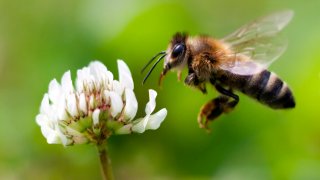
Honeybee collecting pollen at a white flower in an undated image.
Researchers at Washington State University projected that honey bee colonies in the U.S. could decline by up to 70% this year.
Honey bee colonies in the U.S. are projected to decline by up to 70% in 2025, entomologists at Washington State University said on Tuesday.
The university said in a press release that in the past decade, honey bee colony losses have averaged between 40 to 50% annually. But this year, a combination of nutrition deficiencies, mite infestations, viral diseases, and possible pesticide exposure during the previous pollinating season led to higher losses, according to the release.
"Losses have been increasing steadily," Priya Chakrabarti Basu, an assistant professor of pollinator health and apiculture at WSU, said in the press release. "Pollination demands haven’t gone down, so beekeepers face tremendous pressure to keep the same number of colonies to meet those needs."
Get top local stories in Philly delivered to you every morning. Sign up for NBC Philadelphia's News Headlines newsletter.
The implications could be huge.
About 35% of the world’s food depends on pollinators, according to the National Institute of Food and Agriculture.
Brandon Hopkins, a professor of pollinator ecology at WSU, said in a statement accompanying the release that higher losses could also lead to higher costs for farmers who depend on bee colonies.
U.S. & World
Stories that affect your life across the U.S. and around the world.
"I don’t want to be a fear-monger, but this level of national loss could mean increased bankruptcies amongst beekeepers," Hopkins said. "Growers of crops downstream from almonds may need to scramble if the beekeeper they’ve relied on to pollinate their apple trees, for example, isn’t in business anymore."
Honeybees had a production value of nearly $350 million in 2023, according to the Department of Agriculture.
Hopkins added that the extreme honey bee colonies also put the almond industry at particular risk this year.
"The almond industry frequently asks for strong colonies. But this year, growers are desperate," Hopkins said. "Anything with live bees in a box is in demand because the industry is short on supply."
"I haven’t heard of that since the early days of colony collapse around 2008," he added.
This story originally appeared on NBCNews.com. Read more from NBC News:



